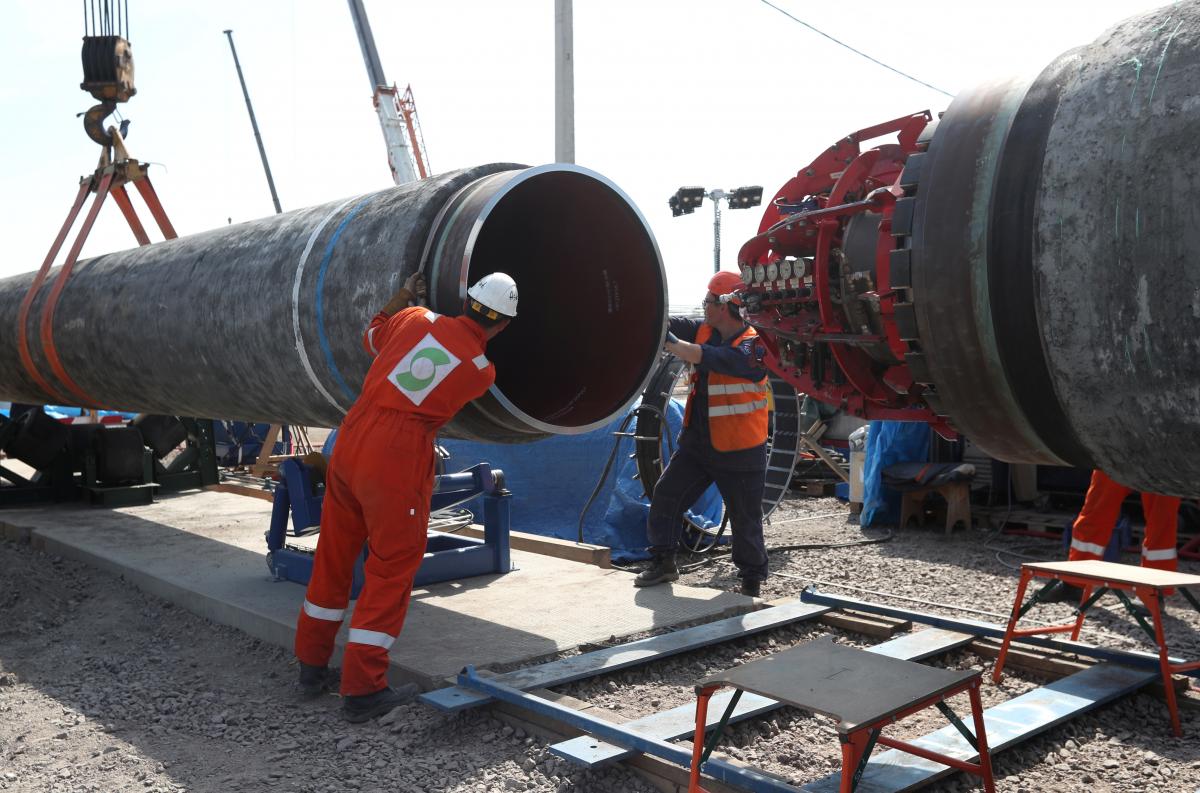
Construction of the Nord Stream 2 pipeline between Russia and Germany should be paused until Russia's parliamentary elections in September to pressure Moscow for democratic reforms and as a compromise between its European supporters and critics, Lithuania's foreign affairs minister said on Friday.
European foreign ministers are expected to reach an agreement on Monday to impose sanctions on allies of Russian President Vladimir Putin in response to the jailing of Kremlin critic Alexei Navalny, Reuters reported.
The nearly completed Nord Stream 2 has been increasingly in focus since Navalny's jailing and Russia's announcement on Friday of the expulsion of European diplomats. But Germany has stood by it, saying it is a commercial project.
"The freeze could be a compromise," Lithuania's Gabrielius Landsbergis told Reuters.
"We do not propose to cancel the project, only to pause it. And to continue it when we are dealing with a democratically elected Russian government. This can actually increase support for the pipeline."
Read alsoRussia's Nord Stream 2 project decimating Baltic Sea ecosystem – Ukraine IntelligencePutin on Wednesday accused the countries that have called for sanctions against the pipeline of trying to use it as a tool to punish Russia.
The link is designed to export gas from Russia directly to Germany by bypassing Ukraine, through which Russia has sent gas to Europe for decades. That would deprive Ukraine of lucrative transit fees and potentially undermine its struggle against alleged Russian aggression.
The operating company of Nord Stream 2, which is 94% complete, resumed laying pipes in Danish waters this month. A Danish maritime regulator has said the work was due to be finished by the end of April.
"If we reward Russia with gas contracts for repressing the opposition, it doesn't send the right signal to Russia, and it fragments European unity," Landsbergis said.
Putin said this week that Russia needed to ensure that its parliamentary elections scheduled for September are free of foreign meddling, following mass protests calling for the release of Navalny.
Opposition activists and European observers questioned the legitimacy of the parliamentary elections in 2016 in which Putin's ruling United Russia party took three-quarters of the seats and liberal opposition parties failed to win a single seat.
Nord Stream 2: Background
- The Nord Stream 2 project envisages the construction and operation of two gas pipeline branches with a total throughput capacity of 55 billion cubic meters of natural gas per year from the coast of Russia through the Baltic Sea to Germany. It should connect Russia's Ust-Lug and Germany's Greifswald. This new pipeline bypassing Ukraine is to be built next to the existing Nord Stream 1 pipeline.
- The construction of the pipeline was expected to be completed before the end of 2019.
- The pipeline will be 1,220 km long. The project is being implemented by Russia's Gazprom in alliance with European companies – ENGIE, OMV, Royal Dutch Shell, Uniper, and Wintershall. Ukraine stands against the construction of Nord Stream 2 as it will most likely lose its status of a gas transit country, while its potential revenue losses are estimated at US$3 billion annually. The project is also highly criticized by the U.S., Poland, and the Baltic States.
- On November 4, 2020, the media reported that U.S. Congress wanted to expand sanctions against Nord Stream 2 and TurkStream.
- On December 6, 2020, United States Charge d'Affaires to Germany Robin Quinville called on the EU and Germany to declare a moratorium on the construction of the Nord Stream 2 gas pipeline.
- On December 9, 2020, the U.S. House of Representatives approved the 2021 National Defense Authorization Act (NDAA) with expanded restrictions against the Russian Nord Stream 2 gas pipeline.
- On December 11, 2020, the construction of the Nord Stream 2 gas pipeline resumed.
- On December 29, 2020, it became known that the House of Representatives overcame the then President Donald Trump's veto on the U.S. defense budget with sanctions on Nord Stream 2.
- The United States is urging European allies and private companies to halt works on Nord Stream 2, and is preparing broader sanctions against the Russian project in the coming weeks.
- The U.S. Senate approved the U.S. defense budget for the fiscal year 2021, which provides for new sanctions against Russia's Nord Stream 2.
- On January 7, 2021, a fund was established in Germany to support the completion of the Nord Stream 2 project.
- On January 13, 2021, the U.S. Department of State notified European companies involved in the construction of Nord Stream 2 of the risk of imposing new sanctions.
- On January 18, 2021, the United States warned allies in Europe about its intention to impose sanctions on the Russian ship Fortuna, which is engaged in the construction of the Nord Stream 2 gas pipeline.

